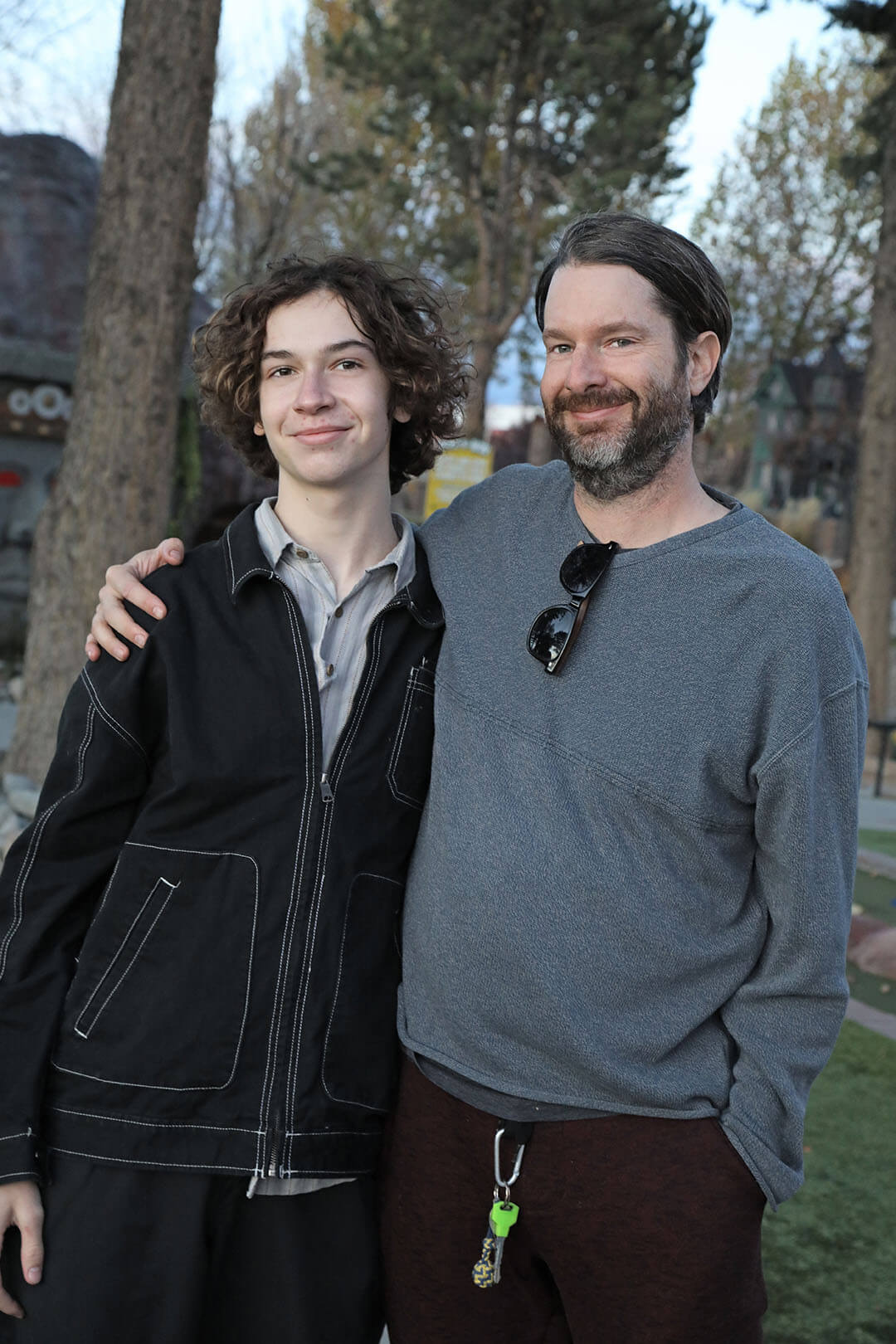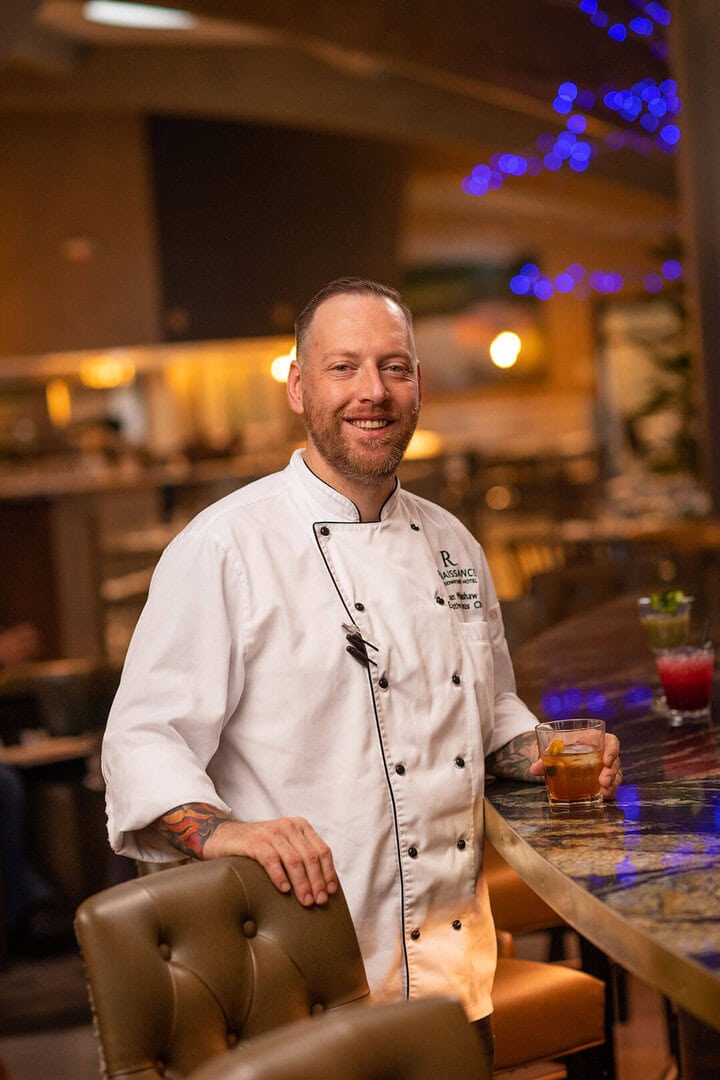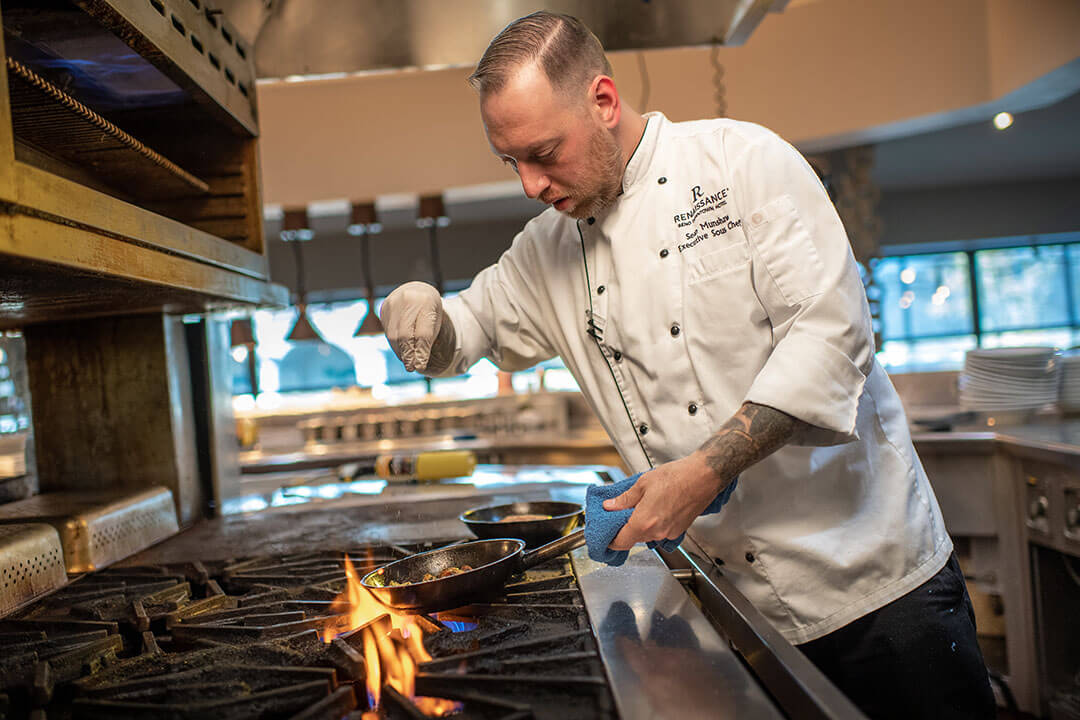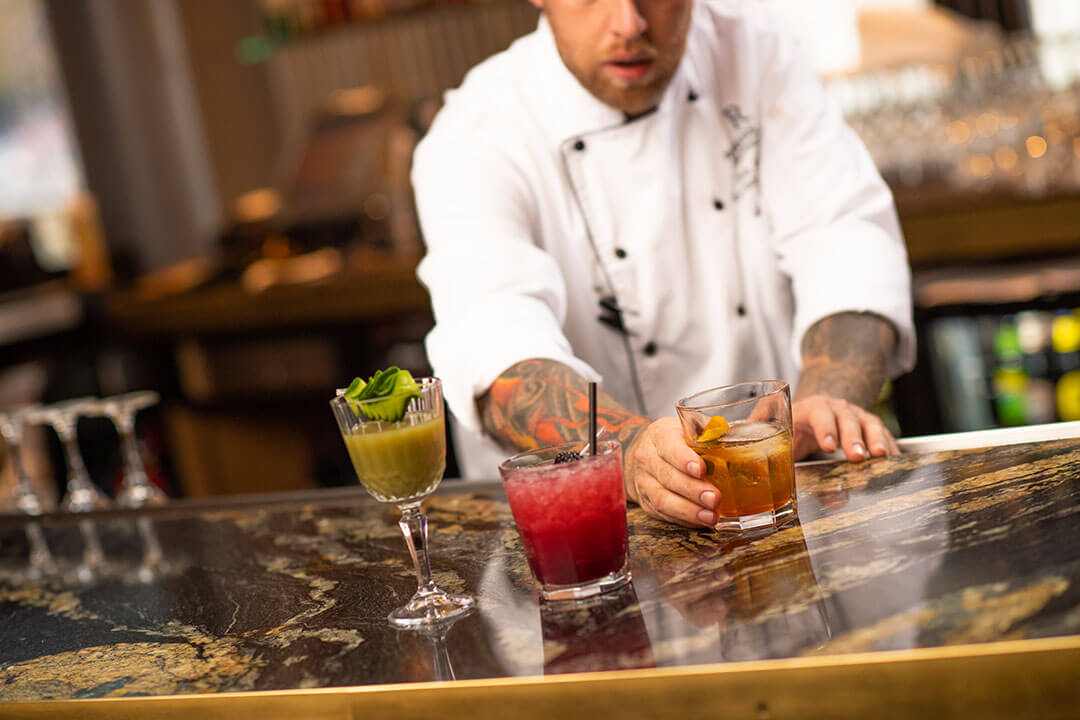Reno-Tahoe chefs talk sober living in the high-stress world of restaurant kitchens.
Life in restaurant kitchens is tough, and chefs bear the cuts, burns, and scars to prove it. There’s the frenetic pace as cooks on the line work to prepare consistently delicious dishes for expectant patrons, spending long hours on their feet in sweltering hot kitchens. By the end of a shift, it’s common to find chefs bellying up to the bar, alongside other kitchen and wait staffs, ready to kick back after a high-stress evening.
For years, the stereotype of the hard-working, hard-partying chef was glorified as chefs earned celebrity status in our increasingly food-obsessed world. But eventually the realities of this lifestyle began to emerge as famed chefs such as Sean Brock — known for his James Beard-award-winning Southern cuisine and massive bourbon collection — went public with their stories of addiction and its fallout, both physical and mental.
It’s a familiar story for Jonathan Chapin, who moved to Lake Tahoe in the late ’80s and worked his way up from busboy to chef in kitchens from the West Shore Café & Inn in Homewood to PlumpJack Café in Olympic Valley.
“For years, I had a pitcher of Jack [Daniels] and Coke on the line, a mirror in the meat drawer, and a bong in the walk-in [cooler],” Chapin says. “I could be in my addiction and still work, and it was acceptable.”
However, as his addiction intensified, Chapin began to lose jobs and friends. He found himself living behind a dumpster before finally checking into rehab. Though he experienced a relapse leading up to the pandemic, catalyzed by back-to-back surgeries after 13 years of abstaining, Chapin has recently found a renewed focus on his sobriety.
“I didn’t go back to a restaurant. I wanted to live my life in this order: sobriety, family, community, and then work. As a personal chef and caterer, I can say no and I can keep my balance,” says Chapin, whose company Reno Recipes also produces cooking shows on Facebook to raise money for local nonprofits, including the Eddy House, Northern Nevada HOPES, and Soulful Seeds.
“I think the days of the big ego chefs and being drunk at work have left, but I don’t think that it’s changed in the sense that it’s very normal for chefs and line cooks to work 10- to 14-hour days and then go sit at the bar,” he continues. “I think it’s not as acceptable to get loaded on the job, but I do think that it’s very acceptable to get loaded at your place of work when you’re done.”
Countering Culture
Removing himself from the Reno restaurant scene also was necessary for chef Adam Bronson as he navigated his sobriety.
“Part of fitting into the restaurant world — the #cheflife — is you kind of had to get good at drinking because there was a party every night. I wanted to fit in. I wasn’t really a drinker before that,” Bronson recalls. “Not only did I get good at drinking, I started to do it to change the way I felt.”
Drinking began to affect Bronson’s life even as a young culinary student back in Kansas City, where he squandered the opportunity to cook alongside his team in the International Exhibition of Culinary Art, known as the Culinary Olympics, because of the priority he gave to partying.
After moving to Reno, Bronson worked at such highly regarded restaurants as Washoe Steakhouse, LuLou’s, Old Granite Street Eatery, and Bistro Napa, to name a few.
“The hours in the kitchen are horrible for the most part. You’re at work when everyone else isn’t. If you’ve got a good crew, they become your family, and chances are they are just like you, so it becomes a dysfunctional family,” Bronson explains. “You don’t take breaks, you don’t have insurance, and you really just sacrifice any sort of personal and social life. You certainly put your body on the line getting cut, burned, and working far too much without really stopping to eat.”
When he reached his mid-30s, Bronson realized he might not survive if his drinking to blackout continued. So he got sober, an achievement he has maintained for nearly nine years.
“I knew for sure that my role, how I interfaced with the industry, had to change. I was also painfully aware that the industry itself was not going to budge. I had to find an equilibrium, and all of sudden it really meant that I needed to work for somebody that understood and believed in a different environment,” Bronson says.

In Sierraville, a town of 85 people roughly 25 miles north of Truckee, Bronson has found that environment at Philosophy Café at Sierra Hot Springs Resort & Retreat Center, where he cooks healthy meals with seasonal, organic ingredients.
“For me, it’s about an appropriate wage and expectation of how many hours I’m going to put in at the job, so I can maintain my mental health and a well-balanced life,” Bronson says. “Right off the bat, I saw that the general manager, my boss, cared more about people than the bottom line. If it wasn’t for this job right now, I don’t know if I would be a working chef in the industry anymore.”
Though it’s not always easy, Sean Munshaw, executive sous chef at Renaissance Reno Downtown Hotel & Spa, works to cultivate that type of environment in his kitchen alongside his executive chef, Jacob Burton, who also doesn’t drink.
“I think the food industry is mixed with two types of people. You have the people who are goal oriented and enjoy the fast-paced side of it and the artistic side. Then you have a misfit motley crew that the kitchens have brought up from inside the partying scene, the counterculture scene,” Munshaw says. “They went into kitchens because they were accepted. If you show up and can work a station for me and wash my dishes, you don’t need experience, or we can teach you whatever you want.”

The counterculture side of the industry is what initially brought Munshaw into restaurant kitchens, where over time his drinking morphed from partying hard after work to cut loose following a hectic day, to then drinking before work, then eventually during work.
Munshaw’s continued promotions and success in his personal life kept him from addressing his drinking problem for years, but eventually regular anxiety attacks, physical ailments, and a series of dangerous situations stemming from blackouts pushed Munshaw to call it quits.
“Now I hold it with pride on my back that I’m sober, and I’m a walking example that it’s possible to function as a chef at a high level,” Munshaw notes. “I think the mental health side has really come to the forefront of our understanding, that this way we thought was cool to live is driving people to the brink of depression, suicide, and addiction. We try to find that work-life balance and pass that on to our cooks and teach them in a different way that grinding for 14 hours on a daily basis isn’t the best way to prosper. You’re going to burn yourself out.”
It’s not uncommon for employees to approach Munshaw about mental health days or accommodating work schedules for therapy appointments.
“It’s not like we’re a non-drinking kitchen, but we’re constantly trying to make sure that you have something outside of work that you’re doing to keep yourself mentally stable and healthy. We ask, ‘What can we do to help you out with that?’” Munshaw says. “I run outside of work and eat healthier. The executive chef I work for does jiu jitsu.”

No ABV
With teetotalers at its culinary helm, the Renaissance is one of a growing number of establishments in the Reno-Tahoe region putting more effort into crafting dynamic non-alcoholic drink menus.
“People don’t want to hear from the bartender that their only option is another non-alcoholic mojito,” Munshaw says.
Guests can instead choose from a seasonal menu of mocktails that feature complex flavors, not just a sugar rush. The Mock T Old Fashioned, for example, uses freshly brewed tea, simple syrup, orange flower water, and verjus blanc — the non-fermented juice of unripened wine grapes — to mimic the classic cocktail.
It’s not just chefs taking a hard look at their drinking habits. Across the country, people are reconsidering their alcohol consumption, whether due to addiction or for health and lifestyle reasons. Books such as journalist Ruby Warrington’s Sober Curious have topped bestseller lists and sparked a movement to reevaluate our society’s relationship with alcohol. A 2019 survey by data firm Nielsen found that 66 percent of millennials say they’re making efforts to reduce their alcohol consumption.
As a result, a burgeoning market of non-alcoholic spirits has emerged over the last five years, aimed at not only those who don’t drink at all, but also the growing number of consumers who actively work to moderate. The non-alcoholic beverage company Seedlip develops spirits using herbs, spices, peels, and barks that are macerated, distilled, blended, and filtered over a six-week period, resulting in dynamic flavor profiles with which bartenders and at-home mixologists can get creative.
Reno Local Food Group, which operates such beloved Northern Nevada eateries as Liberty Food & Wine Exchange, Pizzeria Lupo, and chez louie in Reno; Overland in Carson Valley; and The Union and Cucina Lupo in Carson City, now offers at all of its locations a mocktail featuring Seedlip Spice 94. The blend — distilled using allspice, oak, green cardamom, cascarilla, grapefruit, and lemon — is mixed with amarena cherry syrup, fresh lemon, and ginger beer.
In the United States alone, the sale volume of non-alcoholic spirits grew 289 percent between 2016 and 2020, according to IWSR Drinks Market Analysis. Other frontrunners include Ritual, which concocts a zero-proof whiskey alternative, Monday’s booze-free gin, and Kin Euphorics’ herbaceous elixir, High Rhode, which promises to “nurture neurotransmitters in charge of mood, ecstasy, and reward.”
Stephanie Busby and Nat Lawrence first noticed the gap in non-alcoholic options locally when they were at Burning Man, so when it came time to consider their “gift” for the Black Rock City festival, the couple debuted RestoBar, a non-alcoholic drink stand with health-forward beverages. Busby and Lawrence, both DJs and employees at the Classic Cue Sports Bar & Grille in South Lake Tahoe, still drink alcohol but have cut back on imbibing in recent years.
“We definitely still drink here and there, but it’s not at the forefront like it was in our 20s. I feel like we have taken a step back from alcohol because it negatively affects our energy levels, our wallets, and our productivity the next day. It hasn’t been agreeing with my body,” Busby explains. “At least for me and my friends, we’re all just growing away from it.”
With a decade of bartending under Busby’s belt and Lawrence’s experience as a trained chef, RestoBar serves up uniquely flavored cold brews, turmeric lemonade, coconut limeade, yerba mate with the option to add an assortment of house-made organic fruit purées, and more. The pop-up bar was at a number of festivals this summer, including Bass Camp in Reno, and the pair has started to receive invitations to set up at bars and clubs.
“I think a lot of people are on the same page,” Lawrence adds. “People keep telling us how grateful they are that we’re there.”
A Path Forward
Though certainly the conversation around mental health and substance abuse in the restaurant industry has been elevated, more needs to be done, according to the trio of sober chefs.
“The pandemic did a lot for the industry, and nobody asked for it. A lot of folks are being forced to look at what has to change to keep employees,” Bronson says. “Owners and operators are all scratching their heads wondering why everyone is leaving, but what has to happen for a staff member to want to stay is to feel like they are being heard and can thrive.”
The industry needs more leaders demonstrating what a healthy lifestyle, in and out of the kitchen, looks like, they say.
“I use my story to help other people in Alcoholics Anonymous, through giving back to the community, and in mentor programs with young chefs coming out of Truckee Meadows Community College,” Chapin explains.
“I think, first and foremost, chefs need to realize that being a raging drunk prick all of the time isn’t the way to get through to your crew,” Munshaw adds. “It starts with holding yourself to a standard that you want to achieve and putting yourself out there to try and accomplish those mental, physical, and emotional goals that build your character as a human being and a chef. We need to be good examples.”
Claire McArthur is incredibly grateful for the openness with which Jonathan Chapin, Adam Bronson, and Sean Munshaw shared their struggles with addiction.
SIDEBAR
If you or a loved one is struggling with substance abuse, reach out to the Substance Abuse and Mental Health Services Administration National Helpline at 800-662-4357.
Chef Adam Bronson tells his story in this Culinary Hospitality Outreach Wellness interview at Youtu.be/9QEQCpGZo6s. He is available to speak with anyone interested in chatting about becoming and staying sober. Contact him at 530-536-8022 or Adambronson1979@gmail.com.
For nonalcoholic drink recipes, purchase Julia Bainbridge’s book, Good Drinks: Alcohol-Free Recipes for When You’re Not Drinking for Whatever Reason wherever books are sold.


